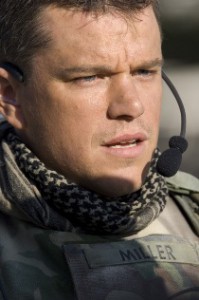Film Review: Green Zone
Article published: Monday, March 15th 2010
Director Paul Greengrass here returns to the successful formula of his two Bourne films, with Matt Damon playing a highly-trained US soldier, cut loose by a spy network at war with itself. In Green Zone however, the plot and action scenes both fall flat.
 Officer Roy Miller (Damon) has been tasked with finding Weapons of Mass Destruction in and around Baghdad during the immediate aftermath of the 2003 invasion. He soon begins to question why he is raiding nothing but long-abandoned factories and “goes rogue” to find the truth. Frenetic action scenes result, shot in Greengrass’s trademark, frenzied style.
Officer Roy Miller (Damon) has been tasked with finding Weapons of Mass Destruction in and around Baghdad during the immediate aftermath of the 2003 invasion. He soon begins to question why he is raiding nothing but long-abandoned factories and “goes rogue” to find the truth. Frenetic action scenes result, shot in Greengrass’s trademark, frenzied style.
While Greengrass’s documentary background makes him unsurpassed at creating a sense of intense realism, the film ultimately fails as a result of the plot’s pursuit of a bland conspiracy. As we know there were no WMDs, the story lacks clout during supposedly revelatory scenes. Themes pushed to the sidelines, meanwhile, are more interesting than the fact that the US government lied in order to go to war, which has been well understood for the best part of a decade. We see tantalising glimpses of poolside parties inside the Green Zone, the heavily protected coalition camp, but there is no explicit effort to contrast this with the ‘Red Zone’ – the rest of the city being torn apart by American bombs and simmering with ethnic tension. Instead, we see Damon rushing between various firefights and angrily demanding answers from US officials.
The uncritical media’s complicity in the war is also only lightly touched on. The brief scene in which Damon speaks to Amy Ryan’s manipulated Wall Street Journal journalist is a potentially important moment. Sandwiched between fights it is quickly forgotten. Similarly marginalised are the Iraqis themselves, almost always running around screaming, looting, or begging for water. Their voice is granted to only two characters, a general of Saddam’s hoping to deal with the Americans, and an English-speaking local who essentially (and ridiculously) becomes part of Damon’s team after volunteering important information.
This good native cliché goes so far that he asks to be called “Freddy”, as though an Arab must be Anglicised to become sympathetic. His characterisation is redeemed a little with the film’s most important line: “It is not for you to decide what happens here”. Unfortunately this sentiment is the exact opposite of everything else expressed in the film, in which good-guy Brendan Gleeson (of well-known good guys, the CIA) is locked in a battle with Cheney-esque bad guy Greg Kennear over, quite literally, the future of the entire country.
The film contains no information on WMDs that a schoolchild in an anti-war march seven years ago wouldn’t have known and the differing views of US officials only solidifies the liberal mantra, “we made some mistakes”. The belief that we have the right to invade anyone we please is never questioned. The real issue is not that we were lied to, but that the mechanisms of government and society made it so easy, and that Iraqis paid the price. Green Zone, along with similarly US-centric The Hurt Locker and virtually every other mainstream release on the war, shows that we still owe them a voice.
Tom Fox
Green Zone is out now on general release
Comments
-
not seen the film but I like the review! bet Tom loved avatar
Comment by adie on March 16, 2010 at 8:10 pm
The comments are closed.



